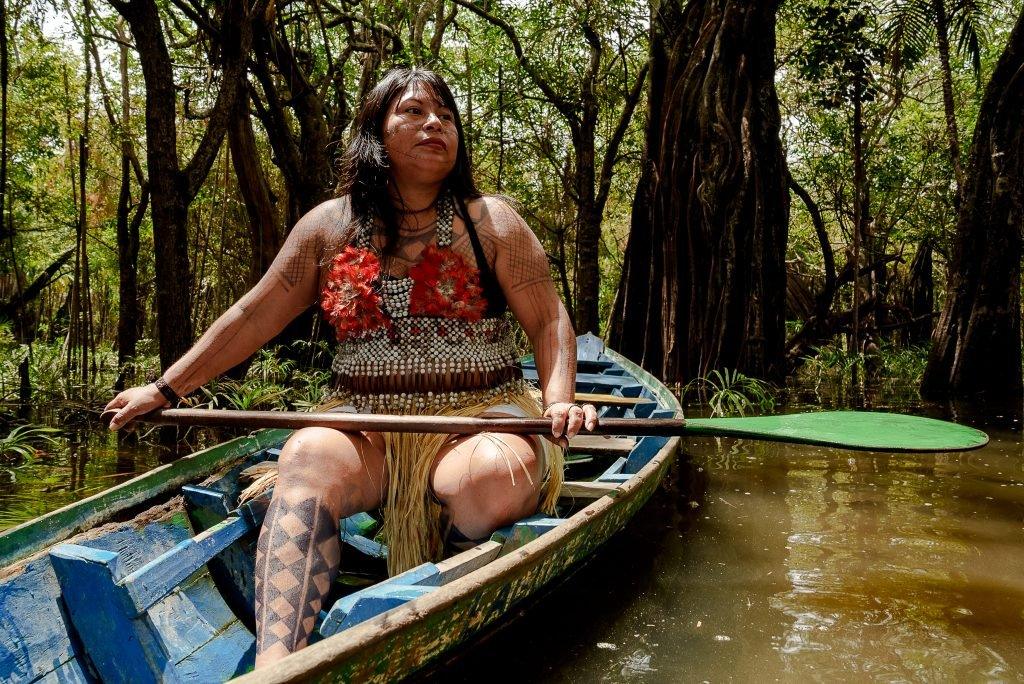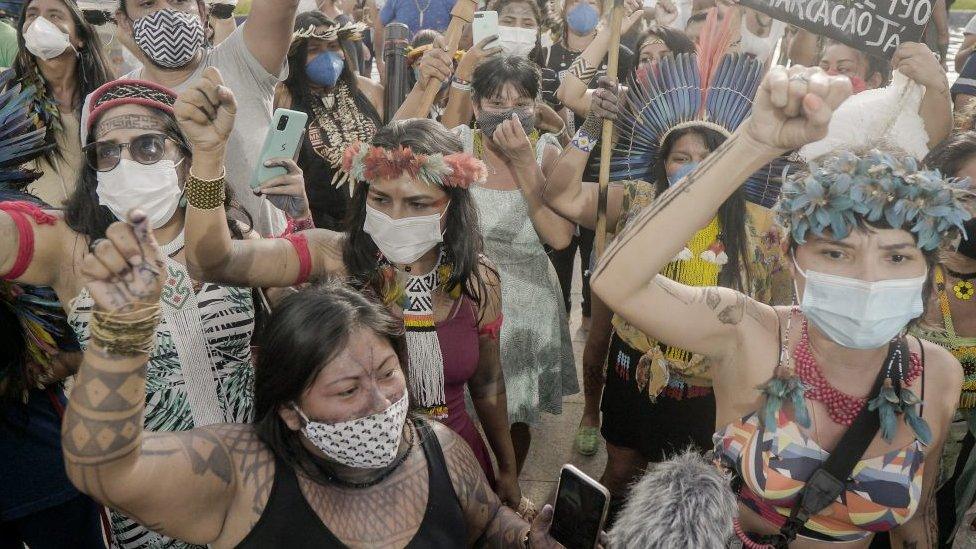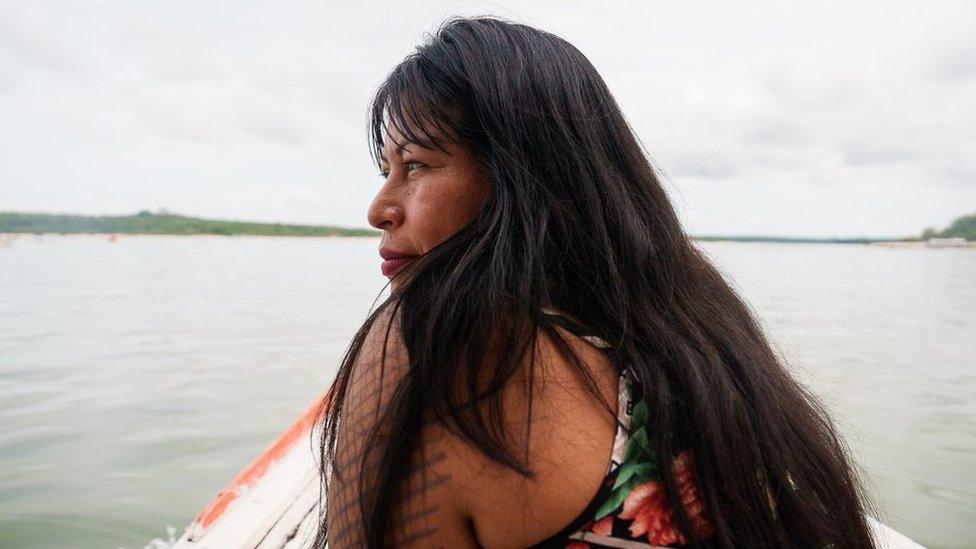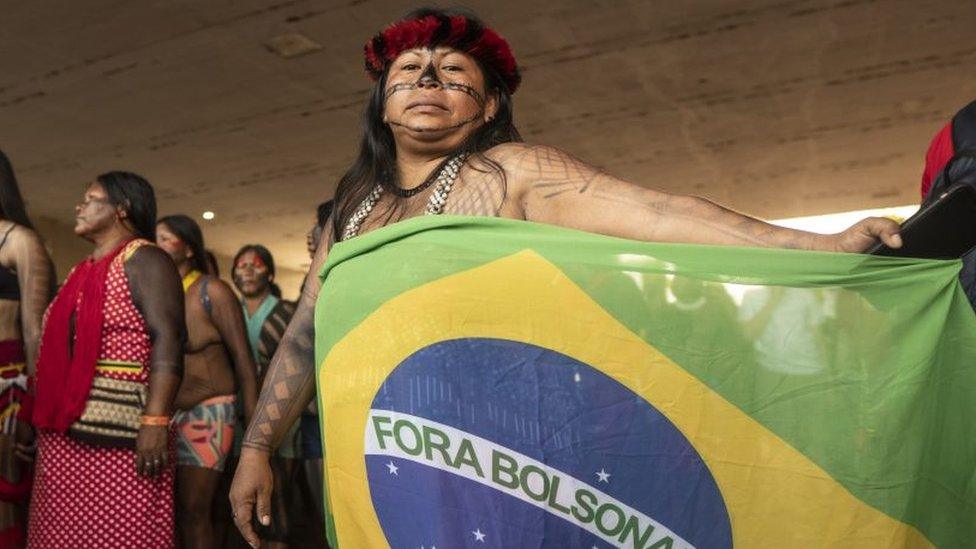Goldman Prize honours indigenous woman who stopped mining giant
- Published

Alessandra Korap Munduruku is the winner of the Goldman Prize for South and Central America
A leader from Brazil's indigenous Munduruku community has been recognised for her successful fight against mining in the Amazon rainforest.
Alessandra Korap Munduruku, 39, has been awarded this year's Goldman Prize, which recognises grassroots activism.
Her vocal campaign to protect the Munduruku territory saw her confronting mining giant Anglo American.
As a result, Anglo American withdrew 27 research applications to mine inside indigenous territories.
The company's move represents a rare victory of an indigenous community over one of the world's largest mining companies.
Asked by the BBC if she found the prospect of taking on the mining giant daunting, Alessandra Korap Munduruku said that she had derived strength from the territory she aimed to protect.
"It [Anglo American] may be powerful to you, but to me, the powerful ones are the river, the strength of our territory and our people, the ant doing its work and the resistance of our people for more than 500 years in the fight for our land."
She also said that social media had played a key role in giving her struggle more visibility, thereby increasing the pressure on Anglo American.
With the help of the Coalition of Indigenous Peoples of Brazil (APIB) and pressure group Amazon Watch, Alessandra drafted an open letter calling for Anglo American to withdraw the permits to conduct mining research inside indigenous territories in the Brazilian Amazon. The permits had been issued without the indigenous communities' informed consent needed under Brazil's constitution.

Alessandra took part in the protest marches, but she says social media helped her struggle gain visibility
At first, the company denied having such permits but following an intense media campaign led by Alessandra, Anglo American said that the concerns raised by her convinced it to formally withdraw the more than two dozen research applications it had already been granted.
Anglo American's move prompted Brazilian mining company Vale to follow suit, with the miner recognising that prospecting in indigenous territories required the consent of the communities.
Alessandra says that she first became active in the defence of indigenous territories in 2014 after she had witnessed how gold mining was affecting her community.
"Where I live [in the Brazilian state of Pará, along the Tapajós river], there are more and more settlements springing up. My people rely on fishing to feed themselves. But there are already places where gold mining has contaminated the water and killed off the fish," she explains.
"When I was a child, I had immense freedom. We fished in the rivers and the lakes, we collected fruits and the seeds we use to make our handicrafts. But starting in 2014, I saw these areas turned into deserts by diggers and other big machines."

The area around the Tapajós river, where Alessandra grew up has suffered from mining and deforestation
Alessandra says that it was these changes that jolted her from her life of looking after her children and her husband and turned her into an activist.
But she says that it was not easy to take on a leadership role in her community at first.
"In our culture, it's traditionally the men who take decisions, it's the men who go hunting and fishing. We women are supposed to stay in our realm, looking after the husband, the children, and the home."
Alessandra was encouraged by another Munduruku woman, Maria Leusa Kaba Munduruku, to defy these rigid gender roles.
I was already helping the caciques (indigenous chiefs) and she saw me and told me: "Alessandra, continue, don't give up, you're going to get a lot of stick from the men, from the [male] chiefs, but we women can't give in."
She says that she always believed it was important for all voices to be heard, including those of the women and children, but that at first she encountered resistance.
"'Why do women want to speak up? Women should look after their husbands, not make speeches,' some chiefs told me," she recalls.
When the Munduruku came under attack from illegal gold miners some years back, Alessandra's own mother begged her to take a step back, but she insisted she had to carry on the fight.
"Mum, while our community and our territory exists, I will carry on the fight [to defend them]," I told her.

Alessandra is determined to continue defending the land her people live on
Alessandra says that over the past decade, more and more women have joined the struggle to defend their territories and are now playing a key role.
She is adamant though, that the key to victories like the one she achieved against Anglo American is built on bringing the entire community together.
The open letter she sent to the company was based on an official declaration drafted in an assembly attended by 45 chiefs and 200 participants.
"We women don't want to overrule the caciques, but we do want to stand alongside them, deciding with them; our role as women is not to divide the community, but to bring everyone together."